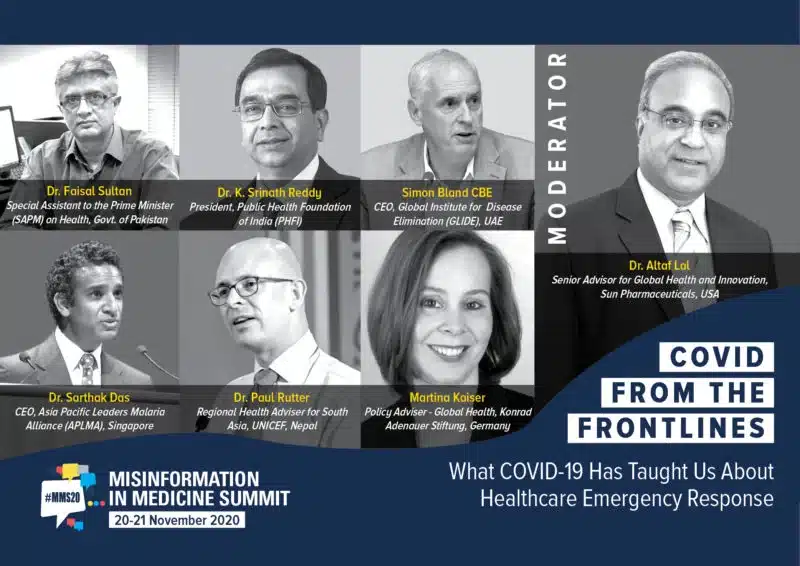The year 2020 has been an extremely tough year. The enormity of the COVID-19 pandemic has halted life as we knew it and has killed more than 1 million people. As we near the end of this year, we brought together six big thinkers from across the globe at the Misinformation in Medicine Summit to discuss the learnings from COVID-19, the challenges of health misinformation, and the road ahead in 2021.
The Misinformation in Medicine Summit 2020 brought together six big thinkers from across the globe to discuss the fundamental learnings from COVID-19. Moderated by Sun Pharma’s Senior Advisor for Global Health & Innovation, Dr. Altaf Lal, the panel brought together speakers with decades of experience in biomedical sciences, health sciences, and public health – at the program, the policy as well as operational research levels. Setting the stage by drawing parallels between the COVID-19 and the 1918 pandemics, Dr. Lal highlighted the issues of misinformation and misconnected information prevalent in the global political and public ecosystem.
The (mis)information ecosystem
“The flurry of information
Dr. K. Srinath Reddy, President, Public Health Foundation of India, echoed the same sentiments as Dr. Faisal. He agreed,
“Misinformation happens by the systematic design of several vested interests who set the thing in motion
He further added, “The powers
Misleading, misconnected, and misinformed actions, political and otherwise, have led to thousands of
Underlining the need for effective leadership, Dr. Lal added, “The leaders need to be served by the appropriate people. A radiologist cannot overnight become an infectious disease expert and advise public health policy.”
The implications of miscommunication were catastrophic even during the 2014 Ebola outbreak in Sierra Leone. Back then, when the message was to refrain from touching the dead body, sacred rituals for the deceased were performed, and often the same water was used by people to wash
“Messages were miscommunicated, and in that process, some 11,000 perished,” said Dr. Sarthak Das, CEO of Asia Pacific Leaders Malaria Alliance while sharing his first-hand experience of handling the crisis.
“One of the most critical things that we as public health experts can do is to establish
A pandemic in the face of residual pandemics
The pandemic’s havoc has regressed the world by every indicator. Nearly 40 million people have been thrown back into extreme poverty. ‘
Even data on malaria narrates a similar story. “It’s too early to say, and make blanket statements,” added Dr. Das. “But it is, however, safe to say that there are major risks associated with both elimination of malaria
Reliable data, even in normal times, is crucial for informed policy decisions. “Having access to data can save lives,” asserted Martina Kaiser, Policy Advisor (Global Health) at Konrad-Adenauer-Stiftung, Germany.
The UN has pointed out serious data gaps – an issue aggravated by the pandemic, especially in low- and middle-income countries.
Progress made towards the United Nations Sustainable Development Goals (SDGs) has turned back by years. The central message in this year’s SDG report, as pointed out by Kaiser is that there’s no
“COVID-19 is leaving more behind, every single day. It is causing more neglect, not less,” added Bland.
What have we learned?
If we draw parallels between the pandemic of 1918 and COVID-19, nothing much seems to have changed. Almost a century back we were fighting
“We were not ready, despite decades of warnings.
A very strong social movement is needed to counter the number of vested interests who have a stake in perpetuating misinformation for gains. Policy-making should be driven by robust science. “Ultimately, what we need is ‘people-partnered public health’ to contain and combat misinformation of this kind,” said Dr. Reddy.
Dr. Das too emphasised on the importance of building a strong culture of communication for public health programs to be delivered effectively and efficiently. “Whether it’s malaria, or COVID-19, or tuberculosis as it continues to be the case, it is the district health managers responsible for delivering the programs to the poor. Public health professionals at these levels need to be equipped with not just management skills but communication skills, along with the ability to use data effectively.”
The United States pulled out of the World Health Organization in the middle of the pandemic – at a time when global support was needed most. The panel held the unanimous opinion that one of the first decisions of President-elect Joe Biden should be on the US’ commitment to rejoin WHO. “A country at the helm of the scientific world ought to be at the helm of WHO as well. To me, it’s a no-brainer,” said Dr. Sultan. There are, however, lessons that should be learned. “We have to do a better job of proving why multilateral cooperation is the right approach. WHO is not perfect, it will need reform,” added Simon Bland. Pointing out the need for a change in US’ behaviour, Dr. Reddy said, “In the process of re-entry, the US must also recognise that it should be respectful of the concerns and priorities of other countries.”
“It fundamentally is about people’s willingness to think in a collective way – commitment and willingness to care for each other and be willing to make necessary sacrifices,” Dr. Das’ pertinent words marked the conclusion of 75 minutes of powerful conversation.
You can watch the recording of the session here.

















